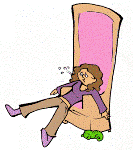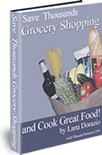Saving Money on Groceries
When saving money on groceries is our goal, there are two strategies to always be keep in mind
Buy less. Or pay less.
There are many ways we can do this
Some are obvious. Some may be new.
One thing is for sure. They all add up. In a good way for a change!
Buying less usually brings to mind strict budgeting, cutting back, doing without... but it doesn't always need to be so dull and painful.
Buying less usually brings to mind strict budgeting, cutting back, doing without... but it doesn't always need to be so dull and painful.
In fact it can be fun, and it feels great to be saving money on groceries instead of once again looking at our overstuffed grocery bill while tossing wasted food.
The first step always begins at home. Sit down and take a bit of time to answer these questions for yourself. Everyone is different, but everyone can probably find a few of their own ways to save money on groceries.
Here are a few ideas that came up for our family to save money on groceries.
Using Less
Sugar is something that you can almost always use less of. My family doesn't notice it, as a matter of fact, the full amount often seems too sweet since
we are not accustomed to it. What else can you use less of?
Laundry soap. I never use the full amount, our clothes are always clean.
Meat in stews etc. I always cook it, put aside some for the freezer and put the rest in the pot. I add bit of oatmeal or ground pumpkin to the recipe in stews etc. No one complains except my husband, but he would eat a whole cow at one sitting if he could :0) This also has tremendous health benefits.
As a matter of fact, using less almost always has a health or environmental benefit.
What Can You Re-use?
Some items may involve a higher initial cost, but as you use them over and over, you get that back and more, in terms of saving money and in terms of making less garbage for our children and their children to live in years down the road.
You can buy containers for storage instead of ziploc bags, for leftovers, freezer storage and children's school lunches.
You can re-use bags, I wash our milk bags, dry them and use them. They are quite sturdy and work well. I also use plastic shopping bags for garbage instead of buying them, although when I do buy them, I go the extra expense and get the biodegradable ones when possible. The only thing with those is to be sure not to store your garbage too long, they break down after a few months.
I also use my tea bags twice. I just put them in a little container between, generally I have 2 a day in the morning so there isn't a long time period between, you don't want to stretch this one too far :0)
How Can You Make It Last Longer?
There are many things sold to use "as is" that can be diluted. Fruit juices are not only cheaper this way, but healthier. They can also be used heavily diluted to up your water intake instead of expensive flavoured water, or unhealthy coloured powders.
You can also dilute your shampoo and dishwashing soap.
This may not fly for older kids, but you can also stretch your milk budget by adding about 50% water with powdered milk. I personally don't mind it, except in tea and it has less fat than using milk straight. It is best after it's been chilled in the fridge for awhile. My kids won't go for it now because I didn't start them on it when they where younger, but it is a thought. I also bake with powdered milk.
Is There a Cheaper Alternative?
I use baking soda and citric acid with a wee touch of dishwasher soap in my dishwasher. It's cheaper and works far better than straight dishwashing soap. I got this idea from a tip to use Tang to clean the dishwasher. Tang is mostly citric acid along with flavouring and sugar.
What Can You Make Yourself Cheaper?
Baking is an obvious answer. If you get in the habit of it it's not so bad and it is also so much healthier and less garbage. (I'm seeing a common thread here).
Of course, cooking meals instead of the drive through and fast food is another obvious one.
I make my own handmade soap too.
The first step always begins at home. Sit down and take a bit of time to answer these questions for yourself. Everyone is different, but everyone can probably find a few of their own ways to save money on groceries.
- What can you use less of?
- What can you re-use?
- How can you make it last longer?
- Is there a cheaper alternative?
- What can you make yourself cheaper?
- What can you cut out altogether?
- How can you reduce waste?
Here are a few ideas that came up for our family to save money on groceries.
Using Less
Sugar is something that you can almost always use less of. My family doesn't notice it, as a matter of fact, the full amount often seems too sweet since
|
|
Laundry soap. I never use the full amount, our clothes are always clean.
Meat in stews etc. I always cook it, put aside some for the freezer and put the rest in the pot. I add bit of oatmeal or ground pumpkin to the recipe in stews etc. No one complains except my husband, but he would eat a whole cow at one sitting if he could :0) This also has tremendous health benefits.
As a matter of fact, using less almost always has a health or environmental benefit.
What Can You Re-use?
Some items may involve a higher initial cost, but as you use them over and over, you get that back and more, in terms of saving money and in terms of making less garbage for our children and their children to live in years down the road.
You can buy containers for storage instead of ziploc bags, for leftovers, freezer storage and children's school lunches.
You can re-use bags, I wash our milk bags, dry them and use them. They are quite sturdy and work well. I also use plastic shopping bags for garbage instead of buying them, although when I do buy them, I go the extra expense and get the biodegradable ones when possible. The only thing with those is to be sure not to store your garbage too long, they break down after a few months.
I also use my tea bags twice. I just put them in a little container between, generally I have 2 a day in the morning so there isn't a long time period between, you don't want to stretch this one too far :0)
How Can You Make It Last Longer?
There are many things sold to use "as is" that can be diluted. Fruit juices are not only cheaper this way, but healthier. They can also be used heavily diluted to up your water intake instead of expensive flavoured water, or unhealthy coloured powders.
You can also dilute your shampoo and dishwashing soap.
This may not fly for older kids, but you can also stretch your milk budget by adding about 50% water with powdered milk. I personally don't mind it, except in tea and it has less fat than using milk straight. It is best after it's been chilled in the fridge for awhile. My kids won't go for it now because I didn't start them on it when they where younger, but it is a thought. I also bake with powdered milk.
Is There a Cheaper Alternative?
I use baking soda and citric acid with a wee touch of dishwasher soap in my dishwasher. It's cheaper and works far better than straight dishwashing soap. I got this idea from a tip to use Tang to clean the dishwasher. Tang is mostly citric acid along with flavouring and sugar.
What Can You Make Yourself Cheaper?
Baking is an obvious answer. If you get in the habit of it it's not so bad and it is also so much healthier and less garbage. (I'm seeing a common thread here).
Of course, cooking meals instead of the drive through and fast food is another obvious one.
I make my own handmade soap too.
It's not always cheaper, but it can be and it can be highly effective as well as better for your skin. It also reduces the need for many products for dry and sensitive skin as homemade soap is much gentler and less drying than store soaps.
What Can You Cut Out Altogether?
Is there something that you buy that is really expensive or unnecessary but is just a habit? An example for us is pizza. We love pizza. I'm sure at one time we would be rich if we had shares in the pizza company. I simply stopped buying it, now it's a treat very occasionally. Garbage, again has gone down as well as the pizza bill. You can make it your self amazingly easily too. Again, it's healthier that way.
I also never buy chemical cleaning products. I get buy very simply with vinegar, baking soda, essential oils and a water spray bottle and a bar of soap. And once again, this is one of the major things you can do not only for the environment, but for your children's health.
What Can You Cut Out Altogether?
Is there something that you buy that is really expensive or unnecessary but is just a habit? An example for us is pizza. We love pizza. I'm sure at one time we would be rich if we had shares in the pizza company. I simply stopped buying it, now it's a treat very occasionally. Garbage, again has gone down as well as the pizza bill. You can make it your self amazingly easily too. Again, it's healthier that way.
I also never buy chemical cleaning products. I get buy very simply with vinegar, baking soda, essential oils and a water spray bottle and a bar of soap. And once again, this is one of the major things you can do not only for the environment, but for your children's health.
Kids are "nose level" with many of the fumes, and young ones easily ingest cleaning products, not only through touch, licking and put their hands in their mouth but as we are too well aware, through drinking dangerous chemicals. Just keep them out of your house. They are not necessary.
How Can You Reduce Waste?
Putting things like yogurt containers and leftovers to the back of the fridge and forgetting about them are prime candidates for waste.
Vegetables often go bad before they are used simply because they are not "easy". Always wash and prepare them when you get home from grocery shopping and put them in the fridge. You will find your kids and yourself eating a lot more of them.
Also think about all the disposable items you might be buying that could be replaced by a permanent one. Coffee filters, disposable bags, razors for shaving, even water. Buy bottled water instead of using a water filter is not only cheaper, and creates a lot of waste, but it also raises health concerns as the plastic is known to leach into the water, the concentrations have been found to vary by length of time stored. Opt for a filter. Again a larger outlay at the outset, but much cheaper and healthier over the long run. And you don't run out as often either!
Recommended
How Can You Reduce Waste?
Putting things like yogurt containers and leftovers to the back of the fridge and forgetting about them are prime candidates for waste.
Vegetables often go bad before they are used simply because they are not "easy". Always wash and prepare them when you get home from grocery shopping and put them in the fridge. You will find your kids and yourself eating a lot more of them.
Also think about all the disposable items you might be buying that could be replaced by a permanent one. Coffee filters, disposable bags, razors for shaving, even water. Buy bottled water instead of using a water filter is not only cheaper, and creates a lot of waste, but it also raises health concerns as the plastic is known to leach into the water, the concentrations have been found to vary by length of time stored. Opt for a filter. Again a larger outlay at the outset, but much cheaper and healthier over the long run. And you don't run out as often either!
Recommended
More Resources
This system works because
it isn't so much WHAT you buy,
it's HOW you buy it.
it's HOW you buy it.
Free Grocery Price Book
included - THE key to saving grocery dollars, 50 simple recipes with
personal notes, and an interview with a grocery store manager with the
"inside dirt" that we all need to know to clean up at the grocery
store.
[an error occurred while processing this directive]



